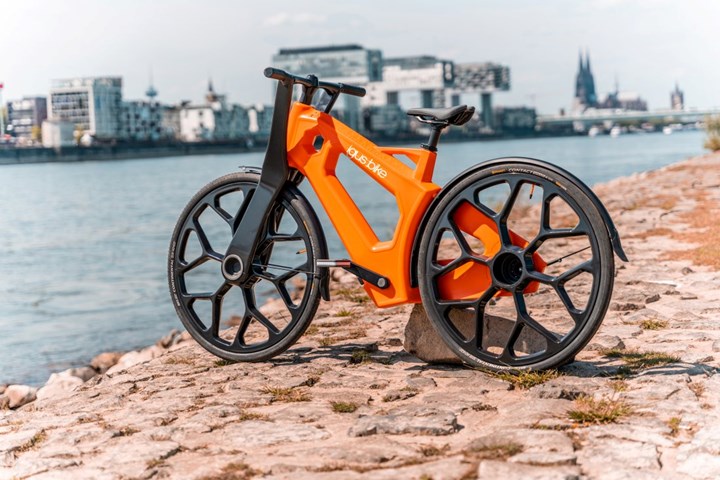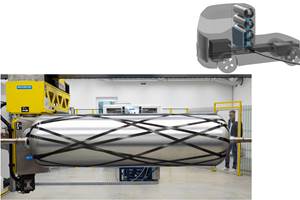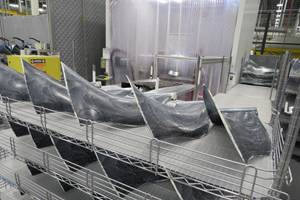Igus Inc. rolls out urban bicycle made entirely from recycled plastic
Lightweight plastics from landfills are used in all parts of the bicycle for a maintenance-free, corrosion-resistant platform, with first functioning model planned for end of 2022.
Aiming to transform the world into a fully circular economy, igus (Cologne, Germany) is making the engineering concept and key components for bicycles made completely of recycled plastic available to all bicycle manufacturers via the company’s igus bike platform. This includes the unveiling of a new durable urban bike made entirely of plastic, from frame to bearings to toothed belt. The first model should be available by the end of the year.
One special feature of this new bike is that the recycled version will be primarily made of “single use” reused plastics. “The plastic in rubbish dumps around the world is becoming a valuable resource,” Frank Blase, igus CEO, says. He first had the idea of a bicycle, now known as the “igus:bike,” on a beach while on vacation. In conversations with employees of a bicycle rental company on the beach, he found out about their major problems with beach bikes. These were continuously exposed to sand, wind and saltwater and sometimes only lasted three months before they had to be replaced. Maintenance and replacement are often expensive and time-consuming in this industry, Blase points out.
The igus bike is easier to own than any other bike, the company contends. Owners can leave the single-speed bike outdoors in all weather and clean it in seconds with a garden hose. “As all components are made of plastic, no part of the bike rusts, even the gears — bicycle gears made of plastic were unthinkable for a long time,” Blase says.
Lightweight, lubrication-free high-performance plastics are used in all parts of the bicycle, from two-component ball bearings in the wheel bearings to plain bearings in the seat post, brake levers and pedals. All of these components have integrated solid lubricants and ensure low-friction dry operation, igus notes — without a single drop of lubricating oil. This ensures that sand, dust and dirt cannot accumulate.
In the igus development laboratories, eight developers are currently working on all moving components of the all-plastic bicycle. Ball bearings, brakes, sprockets, gears and drives are being coordinated by Andreas Hermey, the development manager for energy chains and in close cooperation with the bicycle startup MTRL (Netherlands), a project partner that has successfully put 400 bicycles with plastic frames and wheels onto the Netherlands’ roads. Tried-and-tested existing developments from igus were adapted to the new application. The result is reported to be smooth-operating, quiet, durable plastic components.
The new igus bike platform offers bicycle manufacturers all over the world the opportunity to jointly advance this technology. The platform continuously shows the status and progress of all components and explicitly invites market players to participate. “We want to enable the bicycle industry to produce plastic bikes,” Blase says. The platform is intended to become a contact point for manufacturers who want to build a plastic bicycle and for all manufacturers of suitable components, such as plastic frames, wheels, drives and pinions. The platform is already hosting initial corporate collaborations. One example is Helix.eco for recycled plastics. Many more will follow, igus claims.
MTRL will begin production and sale of a children’s model and an adult bicycle for cities by the end of 2022, igus says. The German launch will be in early 2023. Other versions, such as an e-bike, have also been planned. In the future, the all-plastic bicycle is to be available both in a variant made of new plastic and in one made entirely of recycled material — first prototypes, successfully produced and tested, were made of material from old fishing nets, for example. The adult bike, made of virgin plastic, is to cost €1,200. There will be a surcharge of €200 for the recycled-plastic variant.
MTRL is planning manufacturing facilities near plastic landfills around the world. “From ocean plastics to motion plastics — the igus bike concept has what it takes to become a high-tech ecological product,” Blase contends. “We have lots more ideas, such as installing condition monitoring using igus smart plastics. That would let you use your smartphone to see how many more thousands of kilometers the bike can take. That will hopefully convince many people who are still skeptical about plastic.”
To learn more about the igus bike and watch a video, click here.
Related Content
Combining multifunctional thermoplastic composites, additive manufacturing for next-gen airframe structures
The DOMMINIO project combines AFP with 3D printed gyroid cores, embedded SHM sensors and smart materials for induction-driven disassembly of parts at end of life.
Read MoreCryo-compressed hydrogen, the best solution for storage and refueling stations?
Cryomotive’s CRYOGAS solution claims the highest storage density, lowest refueling cost and widest operating range without H2 losses while using one-fifth the carbon fiber required in compressed gas tanks.
Read MoreSulapac introduces Sulapac Flow 1.7 to replace PLA, ABS and PP in FDM, FGF
Available as filament and granules for extrusion, new wood composite matches properties yet is compostable, eliminates microplastics and reduces carbon footprint.
Read MorePlant tour: Albany Engineered Composites, Rochester, N.H., U.S.
Efficient, high-quality, well-controlled composites manufacturing at volume is the mantra for this 3D weaving specialist.
Read MoreRead Next
VIDEO: High-volume processing for fiberglass components
Cannon Ergos, a company specializing in high-ton presses and equipment for composites fabrication and plastics processing, displayed automotive and industrial components at CAMX 2024.
Read MoreAll-recycled, needle-punched nonwoven CFRP slashes carbon footprint of Formula 2 seat
Dallara and Tenowo collaborate to produce a race-ready Formula 2 seat using recycled carbon fiber, reducing CO2 emissions by 97.5% compared to virgin materials.
Read More“Structured air” TPS safeguards composite structures
Powered by an 85% air/15% pure polyimide aerogel, Blueshift’s novel material system protects structures during transient thermal events from -200°C to beyond 2400°C for rockets, battery boxes and more.
Read More



























